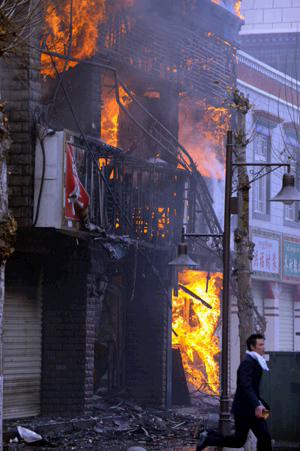REPOSTED FOR ARCHIVING PURPOSES
Original Article Link
 JERUSALEM Here's some news you may never hear about Israel's war against Hezbollah: a missile falls into the sea, a strategic military installation is hit, a Cabinet minister plans to visit the front lines.
JERUSALEM Here's some news you may never hear about Israel's war against Hezbollah: a missile falls into the sea, a strategic military installation is hit, a Cabinet minister plans to visit the front lines.
All these topics are subject to review by Israel's chief military censor, who has -- in her own words -- "extraordinary power." She can silence a broadcaster, block information and put journalists in jail.
"I can, for example, publish an order that no material can be published. I can close a newspaper or shut down a station. I can do almost anything," Col. Sima Vaknin said Wednesday.
Israel believes that as a small country in a near constant state of conflict, having a say over what information gets out to the world is vital to its security. Critics say the policy is a slippery slope not fit for a democracy.
The range of issues subject to censorship in the latest conflict with Lebanese guerrillas are all related to the goal of preventing Hezbollah from using the media to help it better aim rockets at Israel.
The Associated Press has agreed, like other organizations, to abide by the rules of the censor, which is a condition for receiving permission to operate as a media organization in Israel.
Reporters are expected to censor themselves and not report any of the forbidden material. This story was not submitted to a censor. When in doubt, they can submit a story to the censor who will hand it back, possibly with deletions. The AP will note in a story if any deletions have been made. If a reporter violates the rules, he or she suffers the consequences.
The rules include no real-time reports giving the exact locations of guerrilla missile hits; no reports of missile hits -- or misses -- on strategic targets; and no reports telling when citizens are allowed to leave their bunkers for supplies.
Journalists are also not allowed to give details about senior Israeli officials going to the north, where Hezbollah's rockets are falling, until the officials have left the area. They also cannot report places where there aren't enough shelters or where public defense is weak.
So far in this conflict, about one rocket in 100 fired by Hezbollah has killed an Israeli. The rest usually explode in empty fields, tear concrete from abandoned streets or plunk into the Mediterranean. Fired blind, Hezbollah's thousands of mostly short-range, inaccurate munitions simply pose a random peril to Israeli citizens.
For obvious reasons, Israel would like to keep it that way. But live media feedback, the censor says, changes everything.
If a news outlet reports immediately that a missile splashed into the sea, for example, any guerrilla with an Internet connection knows to aim left. Report that an oil refinery in Haifa went up in flames, and Hezbollah will surely celebrate and reload. Report that a senior official is headed north, and rockets will be raining down in no time.
Or so goes the logic of censorship.
But in an era when mobile phones have cameras and the terrorists' weapons include laptops and video crews, even the chief censor acknowledges that a complete blockade of news is in many cases not possible.
"Not in 2006," she says.
Restrictions on the media are not unique to Israel. The United States military makes journalists embedded with troops in Iraq sign a document agreeing not to report specifics of troop movements and attacks in real time, for reasons similar to Israel's.
Critics say the censorship system is worse than ineffective -- it's undemocratic, often counterproductive and a violation of freedom of speech.
"People are entitled to get as much information as they can about what's happening in a conflict," says Rohan Jahasekera, associate editor of the London-based magazine, the Index of Censorship.
Israel's censorship rules are not unusual, he adds, but "it's unusual in that they're enforced."
Jahasekera also disputed arguments that reporting missile landings helped Hezbollah, since the rockets the Islamic militants use are "spectacularly inaccurate."
Bob Steele, Nelson Scholar for Journalism Values at the Poynter Institute, a media studies organization, says editors should bear the responsibility for decisions to publish or not.
"These are decisions that the news organizations and journalists should make with the input of government and military officials," he said. "They should not be decisions that are made by default."
"We should always push back on censorship," Steele adds, "even if it's a losing fight. "


 Journalism Glance
Journalism Glance Fake Videotape used by CNN
Fake Videotape used by CNN America produces some world-class journalism, including coverage of the Iraq War by men and women as brave as Ernie Powell. But I still wish we had a professional Hippocratic Oath of our own that might stir us in the night when we stray from our mission. And yes, I believe journalism has a mission.
America produces some world-class journalism, including coverage of the Iraq War by men and women as brave as Ernie Powell. But I still wish we had a professional Hippocratic Oath of our own that might stir us in the night when we stray from our mission. And yes, I believe journalism has a mission.






























